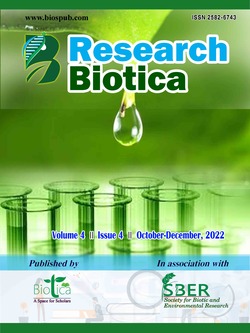
Response of Black Gram Crop to Rhizobacteria
A. Saha*
Dept. of Agronomy, College of Agriculture, Tripura, West Tripura (799 210), India
S. Biswas
Dept. of Agronomy, Bidhan Chandra Krishi Viswavidyalaya, Mohanpur, Nadia, West Bengal (741 252), India
P. Lodh
Dept. of Agronomy, College of Agriculture, Tripura, West Tripura (799 210), India
Keywords: Bacillus, Black gram, Inoculation, Nodulation, Rhizobium
Abstract
Field experiments were conducted during summer seasons in two consecutive years (2020-21 and 2021-22) at Experimental Farm of College of Agriculture, Tripura to find out the best Rhizobacteria inoculants for stimulation of nodulation and increasing yield of blackgram crop. From the findings of two years’ experiment, it can be noted that inoculation of Rhizobium significantly increased the number and dry mass of nodules (32.8 plant-1 and 35.8 mg plant-1 at 30 DAS), plant dry mass (26.8 g plant-1) and grain yield (861.3 kg ha-1) of black gram. Azotobacter chroococcum alone and with Rhizobium numerically favoured the nodulation (29.6 and 34.2 plant-1 respectively) in black gram. Rhizobium + A. chroococcum treatment produced significantly more plant dry mass (29.6 g plant-1) and grain yield (930.6 kg ha-1) of black gram over the uninoculated control (23.2 g plant-1 and 747.9 kg ha-1 respectively) and Rhizobium alone, respectively. Bacillus sp. in conjunction with Rhizobium were statistically comparable to Rhizobium alone inoculation in respect of nodule mass and grain yield. All the three inoculants together gave the 890.3 kg ha-1 black gram yield which was statistically comparable to Rhizobium + A. chroococcum in black gram. So, from the results of experiment, it can be concluded that dual inoculation of black gram seeds with Rhizobium + A. chroococcum promotes significant nodulation of black gram crop with in turn increases the plant biomass and seed yield of summer blackgram crop.
Downloads
not found
Reference
Abdiev, A., Khaitov, B., Toderich, K., 2019. Growth, nutrient uptake and yield parameters of chickpea (Cicer arietinum L.) enhance by Rhizobium and Azotobacter inoculations in saline soil. Journal of Plant Nutrition 42(20), 2703-2714. DOI: 10.1080/01904167.2019.1655038.
El-Sawah, A.M., Hauka, F.I.A., Afify, A.H., 2018. Dual inoculation with Azotobacter chroococcum MF 135558 and Klebsilla oxytoca MF135559 enhance the growth and yield of wheat plant and reduce N-fertilizers usage. Journal of Food and Diary Sciences 10, 67-76. DOI: 10.21608/JFDS.2018.77756.
Habete, A., Buraka, T., 2016. Effect of rhizobium inoculation and nitrogen fertilization on nodulation and yield response of common bean (Phaseolus vulgaries L.) at Boloso Sore, Southern Ethiopia. Journal of Biology, Agriculture and Healthcare 6(13), 72-75.
Jimtha John, C., Jishma, P., Arathy, G.B., Anisha, C., Radhakrishnan, E.K., 2016. Identification of plant growth promoting Rhizosphere Bacillus sp. WG4 antagonistic to Pythium myriotylim and its enhanced antifungal effect in association with Trichoderma. Journal of Soil Science and Plant Nutrition 16(3), 578-590. DOI: 10.4067/S0718-95162016005000026.
Otieno, P.E., Muthomi, J.W., Chemining’wa, G.N., Nderitu, J.H., 2009. Effect of rhizobia inoculation, farm yard manure and nitrogen fertilizer on nodulation and yield of food grain legumes. Journal of Biological Sciences 9(4), 326-332. DOI: 10.3923/jbs.2009.326.332.
Tilak, K.V.B.R., Ranganayaki, N., Manoharachari, C., 2006. Synergistic effects of plant-growth promoting rhizobactria and rhizobium on nodulation and nitrogen fixation by pigeonpea (Cajanus cajan). European Journal of Soil Science 57(1), 67-71. DOI: 10.1111/j.1365-2389.2006.00771.x.
